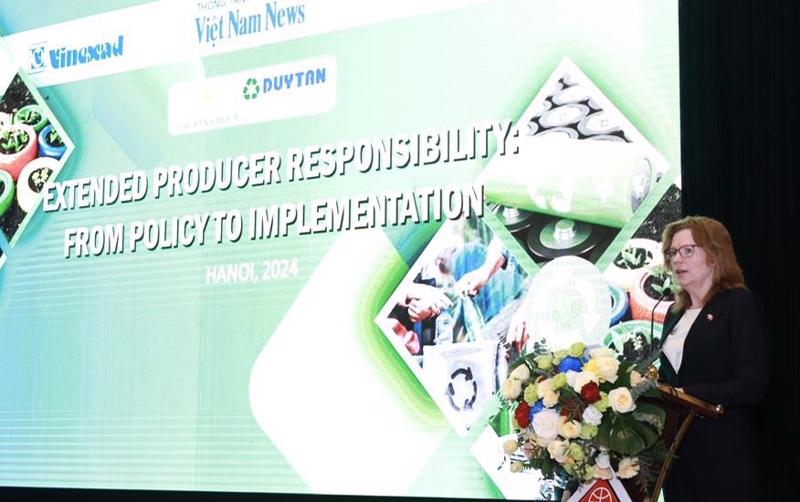Vietnam's recently enacted Extended Producer Responsibility (EPR) regulations hold the promise of preserving resources, reducing environmental pollution, and showcasing corporate responsibility in line with the nation's COP26 net-zero pledge.
However, as the conference "Extended Responsibility of Producers: From Policy to Practice" (April 4th, 2024) made clear, the journey from legislation to successful implementation is fraught with complexities.
Mette Moglestue, Deputy Ambassador of Norway to Vietnam, highlighted Norway's success with their bottle deposit program, where consumers receive a refund of roughly $0.20 (VND 5,000) per returned bottle. This approach has led to remarkably high return rates—approximately 90%.
EPR: What's at Stake?
Outlined in the 2020 Law on Environmental Protection, Vietnam's EPR scheme mandates that manufacturers and importers of products ranging from lubricants to vehicles begin recycling or financially supporting waste reduction efforts by 2024-2027 depending on product items.
Doan Thi Tuyet Nhung, Deputy General Director of the Vietnam News Agency, stressed the importance of EPR for the sustainable growth of businesses amid the pressing challenges of climate change and pollution.
EPR has proven to be a powerful force behind the circular economy model. It promotes the recovery and transformation of discarded products and packaging, diverting materials from landfills. This shift translates into resource conservation, economic benefits, greater social awareness, and a spur for innovation.
Lessons from Norway, Challenges for Vietnam
Norway exemplifies a nation with decades of EPR experience. All businesses handling packaged goods share the burden of recycling. Its beverage bottle system has been particularly successful, with consumers paying a deposit upon purchase and receiving a refund upon return – ensuring high recovery rates.
Mette Moglestue emphasized Norway's commitment to the "polluter pays" principle, a key element in EPR frameworks. However, she acknowledges Vietnam's distinct challenges. The prominence of the informal waste collection sector in Vietnam demands creative strategies for equitable and inclusive integration as part of the EPR system.
The Path to Successful Implementation
EPR's impact extends beyond environmental benefits. Moglestue noted its potential to boost economic development, facilitate recycling industry cooperation, create new jobs, and foster markets for recycled materials. Such an approach positions Vietnam to address its plastic waste crisis and contribute to long-term sustainable economic growth.
Experts at the conference emphasized that realizing this ambitious vision requires concerted efforts, robust government oversight, international cooperation, and continuous dialogue between the public and private sectors. The private sector, particularly, must be recognized as a key innovator capable of finding profitable solutions within the EPR framework.









 Google translate
Google translate